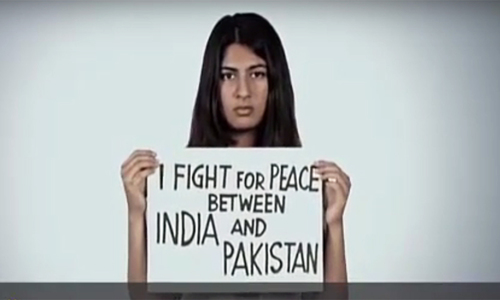IT is not unlikely that Gurmehar Kaur or her mother has read Sahir Ludhianvi’s anti-war poetry. It is also possible they have read Charles Sumner’s views on human strife. Gurmehar echoes an earnest sentiment of the legendary Massachusetts senator who endured physical assault from rivals to oppose the politics of slave trade.
“Give me the money that has been spent in war and I will clothe every man, woman, and child in an attire of which kings and queens will be proud. I will build a schoolhouse in every valley over the whole earth. I will crown every hillside with a place of worship consecrated to peace,” said Sumner.
The words were similar to the frequent voices for peace we hear between India and Pakistan and elsewhere in strife-riddled South Asia. These voices rise and fade with time but the perspectives for a more agreeable future they offer become another strong reminder of the terrifying prospects wars pose.
Gurmehar is the 19-year-old daughter of an Indian soldier who died fighting Pakistanis in the Kargil war. She was only two years old at the time. Growing up required grappling with terrible demons. And so the young girl arrived at her anti-war worldview through a tortuous maze of hatred and distrust, primarily of Muslims and Pakistanis who she blamed for her father’s loss. It was her mother who pulled her back from the destructive journey.
The sight of mothers is universal who weep over the bodies of their fallen soldier-sons.
The history of war and its victims is replete with heart-tugging stories of fortitude and forgiveness, of failure followed by hope. The sight of mothers is universal who weep over the bodies of their fallen soldier-sons. But they never fail to speak up against the insidious lure of war. In India’s current nationalist chaos Gurmehar’s call stands out as an unusual albeit somewhat unheeded voice, but it is a required voice in a season fraught with dire uncertainty.
In a sense her anti-war appeal offers as good a chance as any to bring an urgent ring to the issue. We had heard similar words of anguish from Dwight D. Eisenhower in the 1950s: “Every gun that is made, every warship launched, every rocket fired signifies in the final sense, a theft from those who hunger and are not fed, those who are cold and are not clothed. This world in arms is not spending money alone. It is spending the sweat of its labourers, the genius of its scientists, the hopes of its children. This is not a way of life at all in any true sense. Under the clouds of war, it is humanity hanging on a cross of iron.”
How does Gurmehar put across her own thoughts about war? In a video of about four minutes she posted on Facebook, the Jalandhar-based girl has conveyed the message through a series of 30 placards written in English. There is no voice, only sombre music playing in the background. Some would not hesitate to say her silence speaks louder than words in the video. The placards convey a simple workable request to both the hostile neighbours.
Gurmehar lost her father Captain Mandeep Singh in the 1999 conflict. “I have more memories of how it feels to not have a father. I also remember how much I used to hate Pakistan and Pakistanis because they killed my dad.”
At six, she writes, she tried to stab a woman in a burqa. “Because of some strange reason I thought she was responsible for my father’s death.”
Her mother held her back and made her understand that it was not Pakistan that killed her father. It was war that did. “If there was no war, my father would still be there.”
“Today, I’m a soldier just like my dad. I fight for peace between India and Pakistan.”
“We cannot dream of becoming a First World country with Third World leadership.” Her words are deliberately blunt, and also somewhat impatient in their appeal. There’s “enough state-sponsored terrorism, enough state- sponsored spies, enough state-sponsored hatred. Enough is enough”.
You might wonder what Gurmehar would have made of the galaxy of fine diplomats who had gathered in Delhi last week ostensibly to probe a similar agenda as hers. All of them had been high commissioners who had represented their country in India or Pakistan. Never had one seen so many people in one room carrying nothing but authentic insights about the problems we face and pose with the neighbours. Somehow, my feeling is that they would have yet exasperated the young girl who lost her father while they were pondering the future.
As Pakistan’s most senior former envoy Dr Humayun Khan said there were policy insiders from each side going back to about 50 years. That’s an unusually rich gene pool of experience and knowledge to not strike success if they had wanted. The names form links of particular moments in bilateral ties. K. Natwar Singh, K.S. Bajpai, Shivshankar Menon, Salman Bashir, Aziz Ahmed Khan, Shahid Malik, Ashraf Jehangir Qazi, Riaz Khokhar, G. Parthasarathy among other senior envoys.
There are problems, they told each other and they told us. They are not insurmountable problems provided each side does their bit and doesn’t do something underhand. Though this meeting was an improvement, India-Pakistan parleys are often like Munkar-Nakeer at work, the two angels of death who quiz the dead and apportion blame before assigning heaven or hell to the soul according to their findings.
A typical line of inquiry from the scriptures would be about stealing money from a widow or about drinking alcohol. The bickering and haggling seems to be an unending affair even after we die. And so it seems to be with India and Pakistan too.
Which is perhaps why perhaps an urgent message in Gurmehar Kaur’s poignant placards castigates the “governments of both countries to stop pretending and solve the problem”.
The writer is Dawn’s correspondent in Delhi.
Published in Dawn, May 3rd, 2016














































